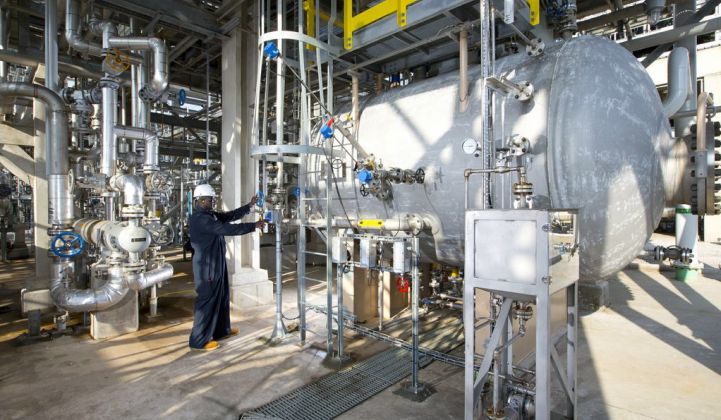KiOR, the biofuel company that’s struggling to ramp up production and keep its flagship plant running, has received a commitment for a $50 million investment from key backer Vinod Khosla, meant to keep the company afloat and jumpstart financing of its second facility.
Last month, KiOR told investors that it had missed production targets at its Columbus, Miss. facility for the second straight quarter, and warned that it needed to raise capital by the end of September “to fund the cash requirements of our ongoing operations.”
Thursday’s $50 million joint commitment, from Khosla himself and Khosla Ventures, should help secure KiOR’s financial security “for at least six more months,” Raymond James analyst Pavel Molchanov wrote in a Thursday analyst note.
He added that the $50 million commitment remains “an anchor as KiOR finalizes its long-term financing package” -- a plan to raise $225 million to build a second plant meant to help the Pasadena, Texas-based company make faster progress toward its long-term production goals.
KiOR’s share price jumped nearly 60 percent to $2.92 in mid-afternoon trading Thursday, although that’s down from the $4.50 range it had traded in the first half of this year, before last month’s bad news.
KiOR, which counts former Secretary of State Condoleezza Rice as a board member, has seen some intense scrutiny of its Biomass Fluid Catalytic Cracking (BFCC) process, the proposed technological solution to do what nature takes millions of years to do: use heat, plus a proprietary catalyst, to convert biological material into an analog of crude oil.
The company went public in 2011 and opened its first plant in 2012, but has consistently failed to meet its stated production goals. At peak, that plant is meant to produce 13 million gallons per year, or about 3.25 million gallons per quarter. But it shipped only 75,000 gallons of biofuel in the second quarter of this year -- far below the range of 300,000 gallons to 500,000 gallons that CEO Fred Cannon had forecasted.
KiOR also reported last month that it has accumulated $265.4 million of operating losses and an accumulated deficit of $296.6 million from its 2007 founding through June 30 of this year, and expects to continue losing money through at least 2015.
Certainly KiOR’s financials indicate that it faces an uphill climb turning a profit on its business of converting wood waste into bio-crude, and from there into liquid fuels like diesel and gasoline. The company reported revenues of $189,000 for fuel product sales in the second quarter, but at a cost of $15.1 million, as putting the plant into service led to plant depreciation and operating and manufacturing costs being presented as cost of product revenue.
Khosla said in Thursday’s statement that he believes “KiOR's proprietary technology platform is substantially better, and can produce hydrocarbon fuels at lower cost, than any other currently visible biofuels fermentation technology, cellulosic or otherwise, that I am aware of.”
The Sun Microsystems co-founder and big green technology investor has not had a particularly successful track record in other biofuel investments, however. One cellulosic ethanol startup backed by Khosla Ventures, Range Fuels, folded in 2011, and another, Cello Energy, was ordered by a federal court to pay damages for defrauding investors in 2009.
Khosla-backed Coskata shelved its IPO plans in 2012 and announced that it was abandoning its biowaste-to-ethanol plans to try to turn natural gas into ethanol. And Gevo, a biowaste-to-butanol startup backed by Khosla that went public in 2011, is being sued by DuPont and BP joint venture Butamax on patent infringement charges.



